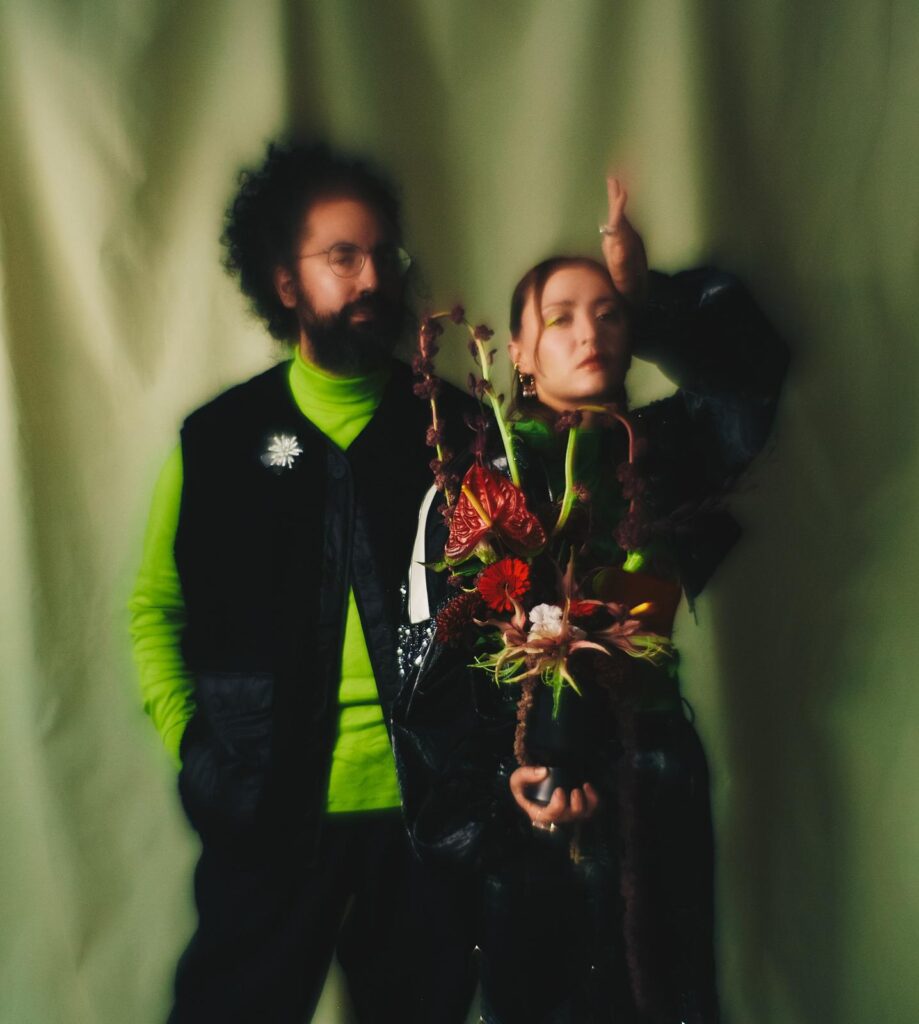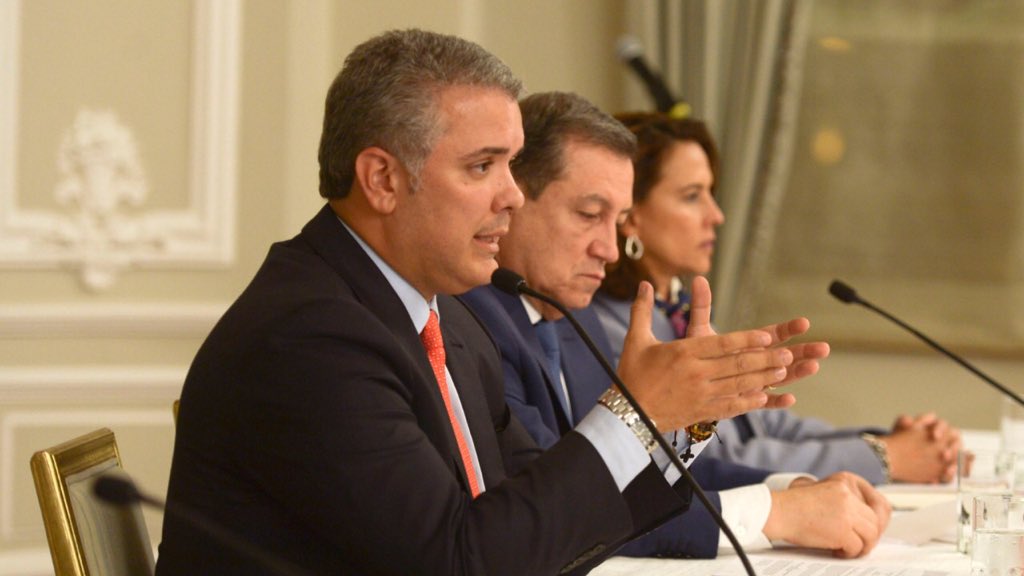With Festival Estéreo Picnic just around the corner, we’re covering the local bands set to light up the event. Today it’s the turn of Salt Cathedral, a non-local local band. They talked to us about Colombian music and culture in a marathon chat.

We’re focusing on local bands in the run up to the festival, but Salt Cathedral had to leave Bogotá for it to come together. They’re from the same barrio in the big bad Bog, but Juliana Ronderos and Nicolás Losada met in Brooklyn, miles from the Colombian mountains. “We are not patriotic or nationalistic,” says Nico, “But we always try to help and promote anything from Bogotá. Because the music is in English and our whole career is outside, we see it as an international band.” They may be far away, but their roots are ever present.
Their music is ghostly and ethereal softpop – calming, occasionally melancholic music equally perfect for the rains of Bogotá or snowdrifts of Brooklyn. No big shows or gimmicks, as Juliana says: “Just me and Nico, that’s it. It’s like a ritual, like a special moment. It’s unique, it only lasts for that 40 minutes. We’re super-prepared to give it our all, like always.”
New album Before It’s Gone is coming soon and it promises to be a big change, with hot-button topics such as climate change, tech and social anxiety to the fore. “The new stuff is very different to the album we put out,” says Juli, adding that they’ll be throwing them into the set: “Five new songs. One will be released before the festival. We’re going to do Paris in Spanish.” Strong Emotions just dropped, featuring a much more indie sound – look out for that in the set:
Juliana has just got back from Norway when we talk over WhatsApp, and Nicolás is wandering around his apartment, seemingly never in one place for much time, saying “For us, we love having the opportunity to play in Colombia, we’re very grateful to be there.” They wax lyrical about their memories of the city traffic and university days.
Despite being in much demand, they’re gracious and generous with their time. The conversation is long and winding, ranging from Sabbath to cultural change and evolution. “I can’t see us moving back, but it’s more of a personal thing,” says Juliana. It seems they’re more positive about the rolo scene than before.
Salt Cathedral: ‘a Colombian band in the diaspora’
They left Colombia frustrated, but those were the old days. Nicolás is cautious, but says “I think it’s changed, but we can’t talk about Bogotá or Colombia now because we go there [only] twice a year and we’re not part of the scene. We’re more of a Colombian band in the diaspora. So I can’t comment on what’s going on, but what I can tell is that there’s things happening.”
Juliana agrees, “Nico’s right, we can’t comment too much. I do know that there’s a very big scene now and I love seeing that there’s so many local bands and there’s more of a culture of going to shows. When we were growing up the show culture was all hardcore and metal, but now there’s everything, a lot of different indie bands so that’s amazing. Growing up in Bogotá was kind of Westernized American. They used to play Guns and Roses on the radio, which they still do! You get in a cab and they play the same music I grew up with.”
This still exists in some extent in New York, Juliana makes clear: “This is something cultural, but Colombians love nostalgia. We have [Colombian] friends here in Brooklyn, and when they come round they play the shit we grew up with. And it’s always the same things.” Of course, NYC is a fertile hotbed of new ideas, and so they both decided to leave, frustrated by a lack of possibilities.
Nico explains, ”we left Colombia because there was no opportunity for people like us who were obsessed with music. There weren’t good outlets and venues, not like in London for example, where everyone thinks they can be the next Bowie. And what were we going to be? The next Shakira? There were no opportunities and we were thirsty for live music, good venues, creativity. In Brooklyn there’s a lot going on. It’s where we feel good about ourselves and there’s lots of opportunities.”
A cerebral outfit, as interested in questions of cultural difference as musical arrangement. “We’re students of music and of society,” says Juliana. “From the cultural side to the musical-theoretical side. Nico and I studied jazz at school and he was in heavy metal and hardcore bands, you know, with the long hair and shredding.” Nico laughs at the memory.
Jazz and hardcore are not what many people think of when they think of ‘Colombian Music,’ something often used to force people into genre boxes, confined to tradition and divorced from contemporary music or genres arriving from overseas. Bogotá especially, though, is a hotbed of diverse and exciting creativity across many genres. Bogotano music is as much lo-fi hip hop, ska-punk, darkwave, minimal techno and punk as it is anything else.
They didn’t feel caged by genre constraints. “We never thought about being in Colombia so we have to do Colombian music. I love Cuban music, but that doesn’t mean I’m going to do Cuban music,” says Nicolás. “Once you say you’re from Colombia, people don’t see the boundaries or the cultural differences. But to us that matters. We’ve never tried to appropriate or make any music that’s autochthonous or that we didn’t grow up with.”
“I feel like Colombia is still trying to discover itself, its identity,” he continues with passion. “It’s a very confusing country, it has so many problems but so many good things too. The concept of having Nidia Gongora on stage, this is great Colombian music. Sometimes people don’t value or champion the sound of Colombia. It’s crazy that there’s this great musical heritage in Colombia and it should be more respected. You should give the same fucking respect to them that you give to musicians from other places.”
There’s always this sense of undermining national talent. I think it’s systematic in Colombia, I feel like musicians are underappreciated in general.” Juliana agrees: “Musicians in society in Colombia are not that well respected. It’s like, ‘ah musico, muy hippie’. People look down on it, people I’ve known for a long time.”
Salt Cathedral both have a deep love for traditional music, as they both stress. Nicolás notes that “We don’t live in Colombia so we’re not surrounded by those rhythms. We acknowledge them, but we’re not part of that. I’m a fan of [traditional] Colombian music, cumbias are incredible. It’s a whole world, it’s so deep that you just get into it. Our music doesn’t have that because we were born and raised with everything at the same time.”
Colombia has a rich musical heritage
Juliana develops the idea further: “I also think there’s a rich musical heritage in Colombia, and cultural heritage in general, because of Colombia’s geography. A lot of that heritage is autochthonous, and we don’t have that. If we wanted to play Pacific music, we’d be going and learning, the same way Quantic did. We could maybe pass it off, because we could say we’re Colombian, but [it’s not] the truth.”
Music is inextricably linked to wider culture of course, as she continues: “I feel like the whole world has gone through this in the past few years, that it’s time to value our own things, whether that’s food or music, whatever. When I was growing up, certain classes saw Colombian food or music as somehow lesser, you know? It’s funny, we all listened to reggaeton, but we didn’t talk about it.”
“You go to Bogotá now,” she continues, “And you see all these restaurants fusing ingredients from the Pacific, from Amazonas, trying to find what’s our thing, what we have here in Colombia. I see that in a positive light, it’s not less.”
When it comes to Festival Estérero Picnic itself, they’re both positive. Nicolás has a wishlist: “I would love to see again Frente Cumbiero, Mabiland, I love La Perla. Nicolás y los Fumadores, I’ve never seen them live.” Juliana adds: “I have seen them live, and I want to see them again, really excited. Also I would love to see Nidia Góngora live, that would be unreal. She’s such an amazing singer and that whole Pacific scene, I feel like I never see that in Colombia. Estéreo Picnic didn’t even exist when we lived in Bogotá, so that’s cool, having local bands play on big sound systems to big crowds.”
Sadly the train won’t take you to Salt Cathedral in Sopó, but you can catch them on the Flamin’ Hot stage at 6.30pm on Friday 24 March.





